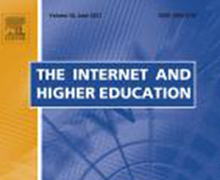본문
Video learning analytics: Investigating behavioral patterns and learner clusters in video-based online learning

By prof. Il-Hyun Jo
Department of Educational Technology
PURE Research Profile
ijo@ewha.ac.kr
A research team led by Dr. Il-Hyun Jo, director of EduTech Convergence Lab and professor of Educational Technology at Ewha Womans University, presented the results of a study on the behavioral patterns of online learners amid the growing need to establish an efficient online teaching and learning environment due to the COVID-19 situation.
Dr. Jo's research team analyzed big data of video-based online learning situations to categorize learner behavior patterns and analyze academic achievement by learning type. Dr. Meehyun Yoon, a research professor of EduTech Convergence Lab conceived the original idea, analyzed data to elicit meaningful insight from learner data and wrote the manuscript with support from Dr. Jo.
The article titled 'Video learning analytics: Investigating behavioral patterns and learner clusters in video-based online learning’ behavioral patterns and learner clusters in video-based online learning)' was published in the academic journal 'The Internet and Higher Education'.
This study was conducted to gain insight into the behavioral patterns of learners in video-based learning using 'Learning Analytics'. Learning analytics is a convergence discipline that measures, collects, analyzes, and predicts data generated in the context and learning behavior that occurs in a technology-mediated learning environment, and supports teaching and learning decision making based on this.
In a rapidly changing environment such as the fourth industrial revolution, pandemic, and wave of advanced technology, educational institutions are planning digital transformation and expanding online courses. Against this background, video-based learning is expected to become the new normal of learning format in the post-pandemic era. Even though video-based learning is expanding, there is a lack of big data research in the context of video-based online learning.
The research team conducted a one-on-one experiment with 72 college students using a video player (LAPA Player; Learning Analytics for Prediction & Action) developed by the EduTech Convergence Lab. Log data and academic achievement were analyzed. As a result of the study, in the video-based learning environment, learners were divided into two groups according to their behavioral patterns. The first group is a group of active learners who are active in social interaction and information seeking, and the other group is a group of passive learners who mainly browsed content. As a result of examining whether there was a difference in academic achievement between the two learner clusters, it was found that the learners in the active learner cluster showed a statistically significantly higher academic achievement than the learners in the passive learner cluster.
This study was able to find meaning in both theoretical and practical aspects. From a theoretical point of view, it was meaningful in that it recognized the patterns that learners showed in the learning process, and that the learning patterns of active and passive learners were automatically analyzed only with log data. The patterns and types of learners identified through research are also of interest in that they provided empirical evidence that enriches the discussion of the theoretical model presented in previous studies.
This achievement is based on differentiated educational strategies and guidelines for educators of various profiles, targeting learners of various profiles, who have become unable to observe learners face-to-face as video-based education such as Zoom has been established as a new normal in the era of the corona pandemic. It will be used to identify learner characteristics to provide.
* Related Article
Meehyun Yoon, Jungeun Lee, Il-Hyun Jo, Video learning analytics: Investigating behavioral patterns and learner clusters in video-based online learning, The Internet and Higher Education, Volume 50, June 2021, 100806
